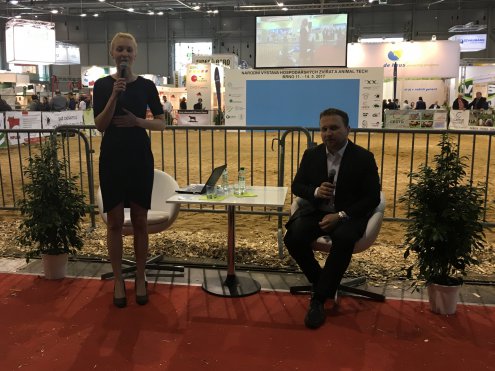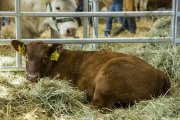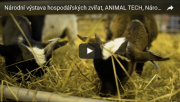Minister of Agriculture under the fire of inquiries
As part of the accompanying programme of the National Show of Livestock, a public debate was held by Minister Marian Jurečka with the public in Hall P. Here, among others, information on support for the milk and meat sectors or on the prospects of working in agriculture.
Questions kept coming in both from visitors and both the Facebook social network, which broadcast the debate live. People were interested, for example, in the current situation of milk and pork producers, which, according to the minister, has got already stabilized and, in comparison with other countries, we were facing the crisis quite well. "I know farmers who have switched from milk production to meat cattle, but I do not know about anyone who would shut down. Last year, roughly a tenth of farmers wound up in Germany, which has not happened in our country, "said Minister Jurečka. He recalled that the crisis began as early as 2014 with the Russian sanctions against the EU, and milk quotas ended in April 2015, and the negative situation in the dairy sector began to show in full with a long-term decline in prices. "The decline in 18 months was very dramatic, by 30 percent, which is unknown in other sectors. At the ministry, we tried to look for maximum support to help farmers cope with the situation in 2016. When we sum up all the measures, we are approaching about 3.8 billion crowns," the minister stated. Both in the dairy sector and pig breeding, he said, farmers with at least average breeding levels did not end up losing. This positive result was confirmed by the chairman of the Holstein Cattle Breeders Union Karel Horák: "On behalf of breeders, I want to thank the Ministry of Agriculture for its support, without which we might not be able to organize this National Championship. Your help made us manage the crisis well. "
Czech agriculture is struggling with the issue of the shortage of workforce, and some of the inquiries also aimed in this direction, including difficulties in securing Ukrainian staff. The main task, however, remains to gain the young generation for work in agriculture. "About 40 percent of agricultural workers have more than 50 years of age, so we try to motivate the young generation on several levels. For example, we encourage farmers to make open days and open their farms for schools. We provide funds for agricultural high schools to buy equipment and teaching aids to be truly 21st century schools. We strive to show this sector as attractive and invest in the quality of education, "said Minister Jurečka, who has not doubts about the prospect of the field."By 2050, global population is expected to grow by about $ 2.5 billion, and food consumption may increase by 60 percent by then, with rising living standards. Climate change makes it impossible for many regions to achieve such food production that will be able to feed local people. The Czech Republic and Central Europe will be a region where there will be room for very good agricultural production, of course if we sort out the issues of soil protection and water management. So if young people are looking for a prospective field that is not stereotyped at all, like work outdoors and with animals, then agriculture and food production are the right answer," declared Marian Jurečka.
In response to another question, the minister advocated the setting of conditions for the support of young start-up farmers, some of whom see it as a barrier to young people entering the field. "The aid is rigorous because certain guarantees are needed that the start of the business will go well and the money spent will not go down the drain. During the seven years of the previous programming period, 1300 young start-up farmers were supported here, and over the last two years we received over one thousand applications, of which 500 have already been approved. Claims are high, but they can be satisfied, "said the minister, according to whom it is the biggest problem for a young person who wants to start farming is to gain access to land."Even though I know of successful farmers who started farming on two hectares and focused on special produce such as blueberries or healing plants. It also determines the quality of the business plan that can fill the gap in the market, "he added.
The debate also dealt with the issues of drought, protection of agricultural land, access to GMOs and glycophosphates, the preparation of a new veterinary law or the possibility of solving dual quality of food.
NVHZ
For Exhibitors
For Media
Partners
![]()
Concurrently with
You might be interested in
Exhibitors 2021








